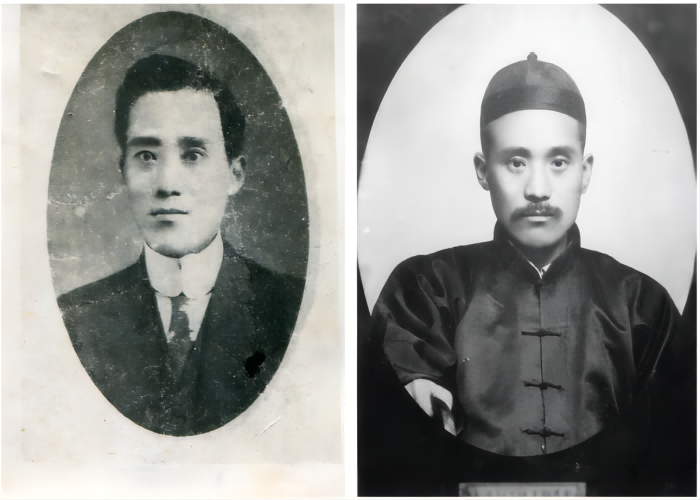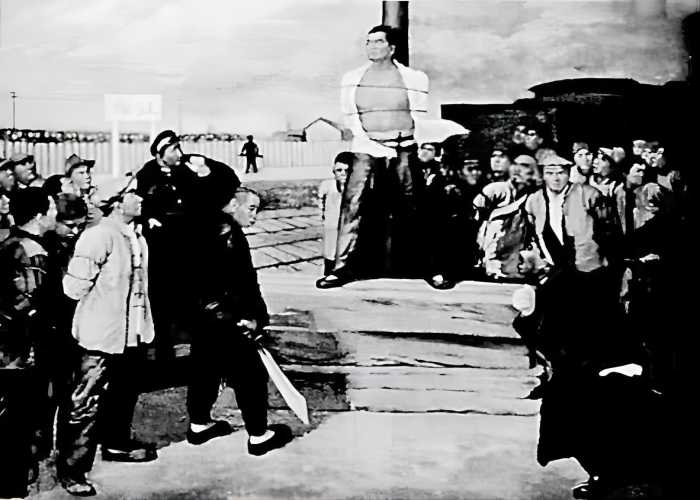On February 15, 1923, Shi Yang, an early outstanding labor movement leader and "labor lawyer" of the Communist Party of China, was persecuted by the Beiyang warlords and died at the foot of Hongshan in Wuchang. In 1936, the Party organization built a tombstone for Shi Yang in the south slope of Hongshan. In 1953, a monument and park were built for him. In 2009, a large-scale renovation was carried out on the Shi Yang Martyr's Cemetery. The Shi Yang Martyr's Monument faces south and is 5 meters high. The front of the monument is engraved with the words "Shi Yang Martyr's Monument" in seven large characters. Not far from the back of the monument is the tomb of Shi Yang Martyr. A statue of the martyr stands in front of the monument, with the following inscription by Dong Biwu in 1957: "The blood history of the 27th workers' revenge remains, Wu Xiaoyi's stench lingers for thousands of years. The lawyer should rely on the righteousness of the world, sacrificing his life and preserving his name as a martyr." The monument is surrounded by towering pines and cypresses, and on both sides of the monument are engraved the "Life Story of Shi Yang Comrade," which is as follows:
Comrade Shi Yang was born in Zhushan, Hubei Province in 1889. He studied hard in his early years and was enthusiastic about politics and the revolutionary cause. On the eve of the May 4th Movement, he graduated from a law school and began to practice as a lawyer. He campaigned for the Wuhan student movement and actively participated in or led the cultural revolution movement, the civil education movement, the Sino-Korean joint movement, and the movement to expel Wang (the warlord Wang Zhan Yuan). He gradually came into contact with progressive groups led by Comrade Yun Daying and further improved his Marxist ideological level. In 1921, he joined the China Labor Union Secretariat and carried out organized workers' movements under the leadership of the Communist Party of China. He launched a general strike of more than 6,000 rickshaw workers in the "concession" area of Hankou to oppose an increase in the fare, and later led a strike at the Hanyang Iron and Steel Factory, both of which were successful. The Wuhan workers' movement and workers' organizations were encouraged by this situation and gradually unified and grew, forming the Wuhan Workers' Union Federation. Comrade Shi Yang continued his work as the legal advisor of the federation
In February 1923, Comrade Shi Yang participated in and led the "February 7th" Great Strike of the workers on the Beijing-Hankou Railway, who were striving for the freedom of assembly and association and opposing the oppression of the warlords. This strike formed a climax in the Chinese workers' movement, greatly shocking the imperialists and their lackeys such as the warlords Wu Peifu and Xiao Yaonan. They resorted to the most despicable and brutal means of massacre to suppress it. On the afternoon of February 7th, the reactionary military police besieged the Jiang'an Trade Union. Comrade Lin Xiangqian, the leader of the trade union, and more than 50 workers were killed on the spot. In the evening, Comrade Shi Yang was arrested and taken to a prison in Wuchang. At 7 o'clock in the morning on the Chinese Lunar New Year's Eve, February 15th of the same month, with the heroic and unyielding spirit of a Communist Party member and the calmness in facing death, Comrade Shi Yang heroically sacrificed his life for the Party, for the working class, and for the revolutionary cause of the Chinese people.
Shi Jigao, the younger brother of the martyr, under the education, cultivation and ideological influence of the martyr, participated in revolutionary activities in his childhood. He was also killed in Wuchang on March 1st, 1928. It is specially noted here in memory of him!
February 1953
The inscriptions on the stele are brief in words but profound in emotion, and concise yet comprehensive in meaning, just like the short but glorious life of Martyr Shi Yang. Reading the inscriptions on the Monument to Martyr Shi Yang with reverence, one cannot but feel a deep sense of awe at his heroic unyielding spirit and an infinite feeling of regret for his calm sacrifice.
The Patriot in the Legal Profession
Shi Yang was born in 1889 in Zhushan, Hubei Province, into a poor family. In 1907, he was admitted to the Agricultural School of Yunyang Prefecture in Hubei. Three years later, he was promoted to Yunyang Agricultural Middle School. During the Xinhai Revolution, influenced by revolutionary ideas, he returned to his hometown to run a school and establish a peasant association. Within a year, thousands of people joined the peasant association, and Shi Yang was elected as the president of the peasant association. In 1915, he studied law at the Private Law and Politics Specialized School in Hubei. After graduation, he engaged in lawyer work. Shi Yang stood up for justice and did not pursue it merely for a living, which won him the respect of people, and he was elected as the vice president of the Lawyers' Association.
During the May 4th Movement, the students in Wuchang were brutally suppressed by the reactionary military police for their patriotic activities. Shi Yang was extremely indignant and actively tried to rescue them. He held an emergency meeting at the Lawyers' Association, put forward a motion to assist the students, wrote to the authorities and printed leaflets day and night, and agitated for a general strike of businesses. He actively gave speeches during the business strike movement and was deeply loved by the masses. At Shi Yang's initiative, the Federation of All Circles in Hubei Province was established. During this period, Shi Yang was also elected as the head of the delegation to petition in Beijing. He actively and proactively contacted the patriots from all over the country in Beijing and carried out the struggle against the Northern Warlords Government's signing of the Treaty of Versailles with Germany. In the winter of 1919, representatives from all provinces gathered in Shanghai, and the National Federation of All Circles was established. Shi Yang was elected as the head of the Appraisal Department.
The Legal Advisor of the Trade Union
In the spring of 1920, after returning to Wuhan, Shi Yang got to know Yun Daiying and Chen Tanqiu, participated in the Marxist Research Association, accepted Marxist theories, and actively participated in the workers' movement. In the autumn of 1921, he was in charge of the relevant work of the Wuhan Branch of the China Labor Union Secretariat, used legal weapons to carry out legal struggles to protect the trade unions, and personally participated in leading the struggles of strikes and business closures. In December, Shi Yang, Lin Yunan and others led the strike of rickshaw workers who were protesting against the rent increase by the rickshaw owners in the concessions. Shi Yang served as an honorary lawyer, drafting the "Strike Declaration" and the "Letter to All Elders, Brothers and Sisters of All Circles" for the rickshaw workers, exposing the crimes of the rickshaw owners' oppression of the workers. He also led the workers to organize a "Rickshaw Workers' Petition for Food" demonstration together with the comrades from the Labor Union Secretariat, achieving a complete victory in the strike. Subsequently, the first trade union organization in Wuhan, the "Hankou Rickshaw Workers' Trade Union", was established, and Shi Yang served as the legal advisor of this trade union. On January 22nd, 1922, the Jiang'an Workers' Club of the Beijing-Hankou Railway was established, and Shi Yang was hired as the legal advisor. In the summer of 1922, Shi Yang gloriously joined the Communist Party of China. According to the instructions of the Party, Shi Yang served as the legal advisor of all the trade union organizations in Wuhan.
In September 1922, under the direct leadership of Mao Zedong, the workers on the Yuehan Railway went on strike to oppose abuse and insult, and to demand a wage increase and improved treatment. Lin Yunan and Shi Yang led the strike movement of the Wuchang Xujiaopeng Workers' Club in Wuhan, echoing the strike movements of the Changsha Xinhe and Yuezhou Workers' Clubs led by Mao Zedong. The strike caused the entire Yuehan Railway to be paralyzed. Afraid that the matter would escalate, the warlord government sent Lao Zhichang, the vice minister of the Ministry of Communications, to Wuhan, attempting to put out the fire of the workers' strike struggle. Upon hearing this, Lin Yunan and Shi Yang immediately organized more than 3,000 workers from the Yuehan and Beijing-Hankou Railways to wait at the Liujia Temple Station in Hankou. After Lao Zhichang got off the train, the workers surrounded him and put forward five conditions, including punishing the violent military police and providing pensions for the injured and deceased. Finally, with the efforts of comrades such as Lin Yunan and Shi Yang, the railway authorities were forced to agree to the workers' conditions. The strike of the workers on the Yuehan Railway, which lasted for 17 days, finally achieved a complete victory.
"Struggles always involve bloodshed, and there's nothing to be afraid of"
Shi Yang's revolutionary activities made the reactionary warlords Wu Peifu and Xiao Yaonan very afraid, and they prepared to lay hands on Shi Yang. Since then, Shi Yang's movements were followed by the enemy, his residence was often under surveillance by spies, and he was even secretly ordered to be wanted. Relatives and friends advised him to lie low for a while, but Shi Yang firmly said, "As a revolutionary, if one doesn't have a few face-to-face confrontations with the reactionary ruling class, the reactionary rule will not collapse, and the revolutionary cause will not succeed. Struggles always involve bloodshed, and there's nothing to be afraid of."
On February 4th, 1923, more than 20,000 workers along the entire Beijing-Hankou Railway went on strike. On the 7th, Wu Peifu mobilized more than 20,000 military police to suppress the striking workers, creating the February 7th Massacre. Shi Yang was arrested by the reactionaries on the charge of "inciting labor unrest".


